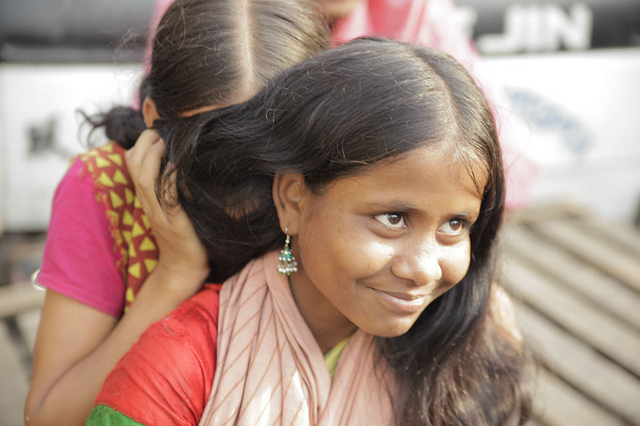Nearly 15 percent, or 1.1 billion, of the world’s population today are girls. To shine light on the extraordinary challenges and threats girls face globally, the United Nations (UN) observes October 11 as the International Day of the Girl Child. This year’s theme is EmPOWER Girls: Emergency Response and Resilience Planning, addressing the disproportionate threats girls and women face from violent conflicts, war and disasters: Nearly 75 percent of refugees and displaced people are female, vulnerable to sexual abuse and other forms of exploitation during conflicts and migration, and in refugee camps.
Wars and disasters compound the problems of the insecure social environments girls already inhabit around the world—a principal focus of IFPRI research on nutrition, health, and gender. UN data shows one in seven adolescent girls aged 15-19 in the developing world are currently married or in informal unions, and more likely to be the victims of human rights abuses including physical and sexual violence, being denied education, and early pregnancy.
Recent IFPRI research from Bangladesh shows adolescent girls and their infants are often more at risk for health complications than adult mothers, even when regularly accessing health services. The nutrition of adolescent girls and young women has been under-prioritized in all regions of the world, and IFPRI findings underline the urgent need to fill knowledge gaps to address adolescent nutrition.
Girls are often denied access to quality education. Another IFPRI study, in the Philippines, finds improved school quality tends to enhance girls’ existing advantages in education and later reduces gender pay gaps when they enter the labor market. Ultimately, these girls may go on to earn more in their adult years than men if they receive high-quality educational investments at an early stage.
Despite the public focus on the problems of women and girls, research on gender faces many handicaps—chief among them a lack of data on girls. Only 41 percent of countries regularly produce violence against women data, according to the UN; 15 percent have legislation that mandates specialized gender-based surveys; and only 13 per cent of countries have a dedicated gender statistics budget.
IFPRI has developed several resources to facilitate research on women and girls, including the Gender Tool Box, a comprehensive clearinghouse of datasets and other resources to assist researchers with applying gender analysis to their work. To bridge acute data gaps, the UN earlier this year launched the Making Every Women and Girl Count program, which aims to increase the availability of accurate information on gender equality and women’s rights in order to inform policy and decision making.
To learn more about IFPRI’s gender-focused research over the last two decades, click here.
Smita Aggarwal is an IFPRI Communications Specialist.







